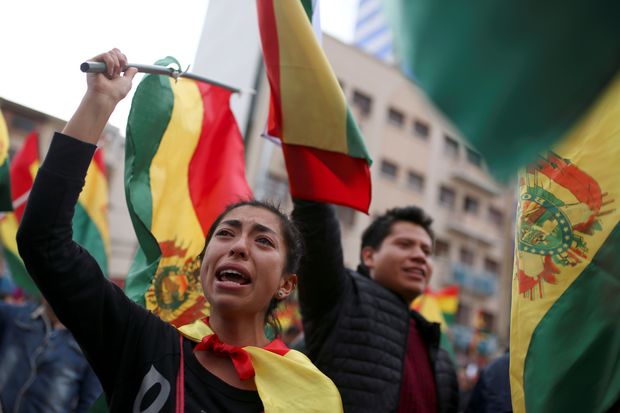RIO DE JANEIRO, BRAZIL – In Bolivia, the de facto government of interim President Jeanine Áñez and the judiciary continue to take action against representatives of the former elected government of President Evo Morales.
Party leaders of the Movement for Socialism (Movimiento al Socialismo – MAS) and former members of the government are charged with corruption and embezzlement of funds. Among them is Luis Arce, current presidential candidate for MAS, who according to polls has good chances of winning the presidential elections in September.

Last Tuesday, the state body in charge of managing the Pension Fund brought criminal charges against ex-Minister of Economy Arce. He is accused of having damaged the state’s economy. Arce allegedly signed a contract with the Panamanian company Sysde for the delivery of a pension payment management software and paid US$3 million in advance. However, the software was never delivered.
There were also irregularities regarding a contract with the Colombian company Heinsohn Business Technology. In addition to the US$10.4 million for the supply of software, an annual lease for the license and use of the source code was agreed in the amount of US$1.6 million. With a contract term of 40 years, the challenged payments would amount to US$78 million.
“We have been deceived this way and it is my duty as a legal representative of the public administration to report this. Now the Prosecutor’s Office will conduct additional investigations and we will help, because we have evidence of this act of corruption,” said Sergio Flores, current head of the State Pension Fund administration. Evo Morales, ex-president and leader of the MAS election campaign, currently in exile in Argentina, replied on his Twitter.
“Because of the imminent electoral defeat of the de facto government, it attempts to bring legal action against the MAS on a daily basis; now it is bringing charges based on false assumptions against our candidate in order to stop his candidacy because he is leading the polls.” Arce publicly defended himself on Tuesday, stating that the software purchase was suspended and that a new solution was being sought. However, this plan was ignored by the de facto government and the urgently needed purchase was put on hold.
The Áñez administration, which came to power after widespread election corruption by Morales, has brought further criminal proceedings for illegal enrichment and corruption against Morales and 17 of the former government’s officials. When 170 ventilators were purchased, excessive payments in comparison to the usual market price and thus approximately US$13,000 per unit were allegedly paid into private pockets.
The current investigations and criminal charges are part of a series of legal proceedings against the former government and MAS party members. Since last year, the Bolivian Prosecutor’s Office has been investigating Morales for his alleged responsibility for sedition, terrorism and the financing of terrorism.
This proceeding and the criminal prosecution have been met with international criticism, particularly in view of the upcoming presidential elections. Most recently, prominent figures and EU parliamentarians sent a letter of protest to the international community. In it they denounced the “selective and racist violence” of the coup government, as already denounced by the Inter-American Commission on Human Rights and the UN Regional Office.
They also speak out against the “systematic persecution of the MAS” and accuse the de facto government of “inhuman treatment, arbitrary arrests and racist discrimination”. They demand free and fair elections under international supervision and welcome the Supreme Electoral Court’s decision to hold presidential and parliamentary elections.
Just over a week ago, after repeated delays, the interim president signed the law setting the elections for September 6th, 2020. The President of the Supreme Electoral Court in La Paz, Salvador Romero, announced on Monday that at least three international organizations had expressed interest in sending election observers to Bolivia. Among others, the EU, the Organization of American States (OAS) and the Association of Latin American Electoral Authorities have expressed their willingness to do so.
Nevertheless, Romero made it clear that international election monitoring would depend on the extent to which air travel was possible in times of conronavirus pandemic. Due to the increasing number of people infected with Covid-19 in Bolivia, the de facto government continues to maintain its borders closed and has extended the so-called dynamic quarantine until the end of July.
The new elections are necessary because a right-wing interim government took power after the fall of Morales following the October 20th, 2019 election. The OAS considered his re-election in the first round to be a “fraud”, thereby encouraging unrest in the country. The police and army sided with the opposition and forced Morales to resign. Morales fled the country together with his vice-president Álvaro García Linera.
Weeks later, the OAS sent a team of experts to Bolivia to prove the alleged forgery and manipulation of voting machines. Since then, the OAS final report has been challenged by several studies and the theory of electoral fraud has been increasingly weakened.

